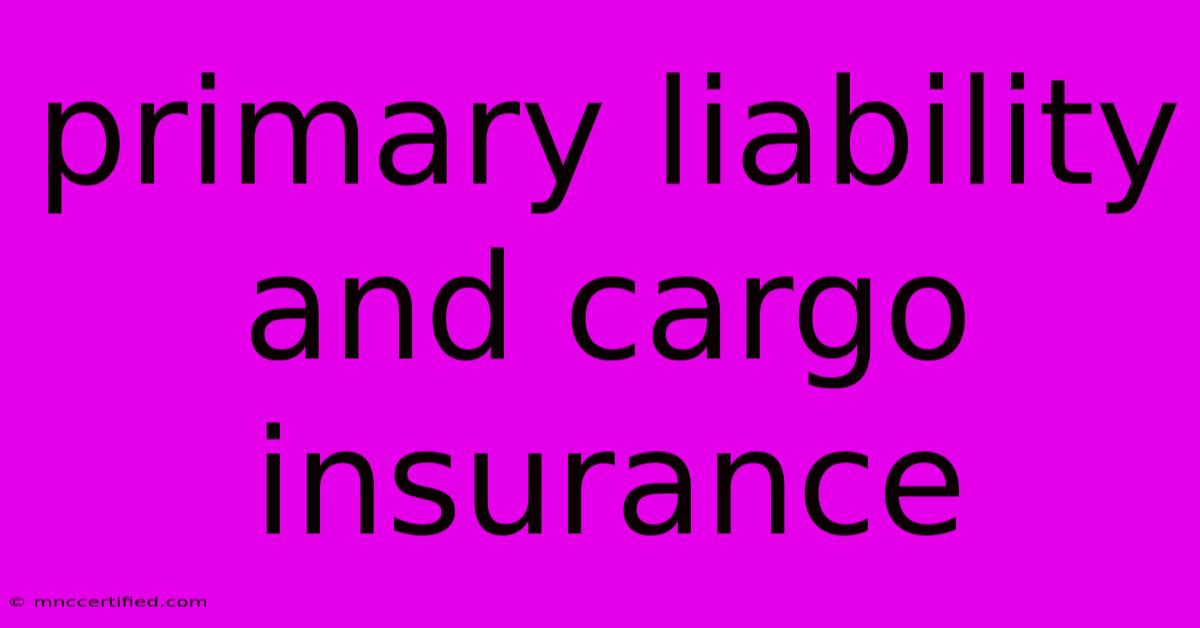Primary Liability And Cargo Insurance

Table of Contents
Navigating the Waters of Primary Liability and Cargo Insurance
In the bustling world of international trade, where goods traverse vast distances across land and sea, cargo insurance plays a crucial role in protecting your business from potential losses. But understanding the nuances of coverage, especially the concept of primary liability, is essential for making informed decisions. This article delves into the key aspects of primary liability and its relevance in cargo insurance, equipping you with the knowledge to secure optimal protection for your valuable shipments.
Understanding Primary Liability
Primary liability refers to the initial responsibility for covering losses or damages to cargo during transit. It typically falls on the party designated as the carrier under the shipping contract, whether it be a shipping line, trucking company, or airline.
For example, if a container of electronics is damaged during ocean transportation due to rough seas, the shipping line would initially be responsible for covering the loss, assuming it was not caused by an excluded event (e.g., inherent vice of the goods).
The Role of Cargo Insurance: Secondary Protection
While the carrier might be primarily liable, cargo insurance steps in as secondary protection. This means that even though the carrier may bear initial responsibility, the policyholder (the owner of the goods) can still file a claim with their insurance company for compensation.
This secondary protection is crucial for several reasons:
- Carrier Insolvency: If the carrier faces financial difficulties or goes bankrupt, the policyholder may not receive full compensation for their loss. Cargo insurance provides a safety net in such situations.
- Carrier's Limitations: Carriers often have limitations on their liability, such as per-package or per-unit limits. Cargo insurance can cover the remaining value of the goods exceeding these limits.
- Expanded Coverage: Cargo insurance policies often cover a wider range of risks compared to a carrier's liability, including perils not typically covered by the carrier, such as theft, fire, or terrorism.
Navigating the Fine Print: Key Considerations
When choosing cargo insurance, it's essential to understand the following:
- Policy Type: All Risks policies offer comprehensive coverage for various perils, while Named Perils policies only cover specific risks mentioned in the policy.
- Exclusions: Cargo insurance policies typically have exclusions for certain perils like inherent vice, war, and nuclear risks. Careful review of these exclusions is essential.
- Deductibles: Deductibles are the initial amount of the loss that the policyholder must cover before the insurance company pays the remaining amount. Choosing an appropriate deductible can help manage premiums.
- Insurance Value: Determine the proper insurance value for your cargo. This should be based on the current market value or replacement cost of the goods.
Conclusion: A Vital Safety Net
Understanding primary liability and the role of cargo insurance is crucial for businesses involved in international trade. While carriers bear initial responsibility, cargo insurance provides essential secondary protection, ensuring that your business is not left vulnerable to significant financial losses. Carefully selecting the right policy type and understanding the nuances of coverage will empower you to make informed decisions, securing optimal protection for your valuable cargo.

Thank you for visiting our website wich cover about Primary Liability And Cargo Insurance. We hope the information provided has been useful to you. Feel free to contact us if you have any questions or need further assistance. See you next time and dont miss to bookmark.
Featured Posts
-
Is Brain Mapping Covered By Insurance
Nov 10, 2024
-
Embark General Insurance Phone Number
Nov 10, 2024
-
Trisura Insurance Claims Phone Number
Nov 10, 2024
-
U 19 World Cup Qualifiers Nepal Vs Thailand Preview
Nov 10, 2024
-
Shaws Inclusion In Mushtaq Ali Probables
Nov 10, 2024